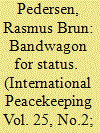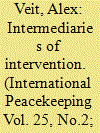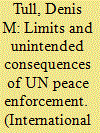| Srl | Item |
| 1 |
ID:
158106


|
|
|
|
|
| Summary/Abstract |
Why do the small Nordic states engage themselves in militarized interventions alongside the United States? The article argues that the Nordic states gradually have begun to perceive militarized coalition participation as an important tool to gain reputation and improve their status position. A good relationship with the United States is considered as a means to either consolidate or improve their relative status position and also secure protection or ‘shelter’ against regional competitors by improving their reputation. Empirically, the article contributes to our understanding of the status-seeking strategies of the Nordic countries and how they might have utilized a more militarized activism to seek status that departs from the traditional Nordic internationalism. Theoretically, the article contributes to our understanding of the concept of ‘status’ in international relations by offering a new explanation of the puzzling willingness of small states to use military means in international conflicts where immaterial gains play a larger role than otherwise assumed in the realist small-state literature.
|
|
|
|
|
|
|
|
|
|
|
|
|
|
|
|
| 2 |
ID:
158105


|
|
|
|
|
| Summary/Abstract |
Since 2003, the European Union (EU) has launched eight military operations with an executive mandate in the framework of its European (now Common) Security and Defence Policy (ESDP/CSDP), all of which have utilized deterrence to fulfil their missions. Some have done so implicitly by having a mission that requires them to keep certain actors from doing something unwanted, whilst others have done so explicitly by having deterrence clearly mentioned as one of their core tasks in their mandates. Despite this, deterrence in the context of CSDP has been an almost totally neglected subject in the academic literature. Furthermore, the EU itself has tended to take the deterrence effect of CSDP operations for granted, which is dangerous because it may blind it to potential problems that may in fact be undermining their credibility. This article seeks to launch a more focused discussion on deterrence in the context of EU security policy by analysing the credibility of CSDP operations’ deterrence postures. Based on findings from case studies on operations Althea and Atalanta, it argues that CSDP operations’ deterrence postures lack credibility because they have insufficient resources for taking care of their deterrence tasks. Furthermore, they do not communicate threats effectively.
|
|
|
|
|
|
|
|
|
|
|
|
|
|
|
|
| 3 |
ID:
158108


|
|
|
|
|
| Summary/Abstract |
Why do international peace- and state-building interventions regularly fail to transform conflict-ridden countries into liberal states? This paper argues that interventionists’ practices and dependency on local intermediaries help explain the disappointing outcomes of intervention. Based on a relational theoretical approach and original empirical material, the paper compares two of the largest peace- and state-building interventions in recent years. For practical and normative reasons, peacebuilders need to find local partners who help them instil change. However, as partners of peace- and state-building interventions, local elites may appropriate international resources and use them to strengthen their own positions. Interventionists abstain from sanctioning such appropriation as long as their own short-term and purpose-oriented goals are not undermined. Contrary to assumptions in much of the literature, interventionists do not eagerly defend their alleged liberal agendas. Instead, their pragmatism strengthens existing neo-patrimonial figurations rather than fostering fundamental transformation. The paper argues that research should focus on peacebuilders’ actual practices rather than normative statements. Such an approach allows for a better understanding of evolving political orders in conflict societies.
|
|
|
|
|
|
|
|
|
|
|
|
|
|
|
|
| 4 |
ID:
158104


|
|
|
|
|
| Summary/Abstract |
Recent scholarship has discerned an increasing tendency of the UN Security Council to push the boundaries of UN peacekeeping beyond traditional doctrine by equipping peace operations with ever more robust and even peace enforcement mandates. The first and most frequently cited example of this turn is the so-called Force Intervention Brigade (FIB) in the DR Congo. Yet, a comprehensive account of the FIB experience is still missing. Authorized in March 2013 to launch offensive military operations against insurgent groups, the FIB may come to epitomize a sea change in the transition from robust peacekeeping to a qualitatively different kind of UN peace operation. Thus, studying the FIB can offer important insights about the advantages and challenges that may be in store for the UN, should the organization indeed turn towards peace enforcement. The articles analyses the origins, performance and consequences of the FIB in terms of conflict resolution and state-building. It also examines its organizational impact on the UN peace operation in which it was embedded (Monusco). It finds that the FIB has not proven to be the game changer. Instead, it had unintended negative consequences both on state-building and the performance of UN peacekeepers.
|
|
|
|
|
|
|
|
|
|
|
|
|
|
|
|
| 5 |
ID:
158107


|
|
|
|
|
| Summary/Abstract |
There is a widespread assumption that, given the imminent threat of mass atrocities against the Libyan civilians – especially in Benghazi – and in the absence of non-military alternatives, military action against the regime of Muammar Gaddafi was a justified and necessary response. This paper challenges this widespread assumption. It argues that on the eve of NATO-led military intervention, there was no ‘clear evidence’ to suggest that the Libyan regime was on the verge of committing mass atrocities against civilians. This research also documents the range of political and diplomatic options open to the international community to engage with Gaddafi, all of which were sidetracked in favour of military action. Despite the brutality of Gaddafi’s rule, military intervention in Libya did not meet the Responsibility to Protect’s (R2P) ‘just cause’ and ‘last resort’ criteria. Far from being a successful application of R2P’s most coercive pillar, the Libyan case was a manifest misapplication of R2P's military component. An objective analysis of the Libyan crisis during February and March 2011 should have prevented the use of military force.
|
|
|
|
|
|
|
|
|
|
|
|
|
|
|
|
| 6 |
ID:
158109


|
|
|
|
|
| Summary/Abstract |
Cohesion has a positive influence on many aspects of everyday life, including improved military performance. However, due to focus on the positives, many studies tend to omit potentially negative outcomes of cohesion. It is particularly important in regard to authoritarian military institutions, in which unit cohesion can have unintended consequence resulting in dehumanizing effect of the out-groups. The following research examines the process from cohesion to dehumanization and argues that there is a need to change the way how unit cohesion is achieved. The distinction is made between the controlled and autonomous cohesion. It will be argued that autonomous locus of causality is potentially more beneficial for military cohesion and performance in conflict environments.
|
|
|
|
|
|
|
|
|
|
|
|
|
|
|
|